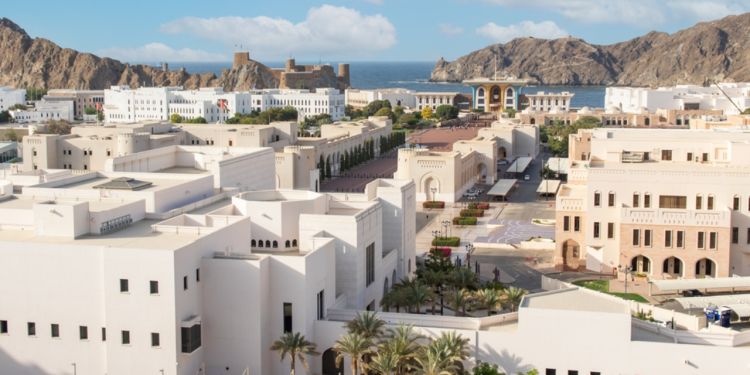
Oman offers a variety of housing options that cater to different needs, budgets, and lifestyles. Whether you're single or an expatriate family, you can find housing ranging from luxury apartments to affordable family homes. Whether renting or purchasing, expatriates can find accommodation that matches their budget and preferences.
When a company offers a job to someone new in Oman, depending on the position, they tend to offer accommodation or at least a housing allowance. Generally, single lower-grade workers are provided shared accommodation in a labor camp or a shared company building. Therefore, it is essential to check with your employer before moving to Oman to see for how long they will provide you with a place to stay.
Types of accommodation in Oman
Shared housing
There are two kinds of shared accommodations in Oman: the ones provided by the employer and the ones leased by employees. Some major companies rent full buildings to accommodate their workers. It is possible to be given a single room with shared facilities for single employees or an entire flat for families and higher-level employees. Unskilled workers are also generally provided transportation to and from their workplace.
Good to know:
When a company provides accommodation, the housing allowance is generally deducted directly by the employer.
On the other hand, there are also many employees hired by smaller companies who have to find shared accommodations by themselves once they reach Oman. It is quite easy in major cities, such as Muscat or Sohar, but tends to be very difficult in remote areas. Moreover, the allowance given to lower-skilled workers can be very low, so whenever it is possible, employees try to share a flat.
One of the main issues with renting single rooms is that, generally, only one lease contract with one name is issued for the entire flat. In this case, it is important to make sure that the company can support you with a lease agreement on one of their premises, even if you live in your own place.
It is not technically allowed to have shared accommodation with many workers in all districts in major cities, but many landlords are just looking at getting their places occupied.
Good to know:
Having a mixed residence with unmarried people is now prohibited. There is also a limit of two people per room, even if they are same-sex households.
Individual apartments
There are a few small studios available in Oman but it's easier to find 2 and 3 BHK apartments. The country is hot and humid for more than 6 months per year; therefore, most apartments don't have a balcony and are designed for an indoor lifestyle. Serviced apartments are available in cities like Muscat for foreigners who prefer short-term stays. They come fully furnished with amenities like housekeeping and are popular for business travelers.
Twin villas
Twin villas, also known as semi-detached villas, are a popular housing option in Oman, especially for families and expatriates looking for spacious homes with modern amenities. These villas typically feature two adjacent units that share a common wall, providing a balance of privacy and community living. Twin villas are usually designed with two identical or mirrored units, each with separate entrances. The typical layout includes multiple bedrooms (3 to 5), a living area, a dining area, a kitchen, and sometimes a private garden or backyard. In some villa communities, residents may have access to shared facilities like swimming pools, gyms, and playgrounds.
Gated communities
Apartments or twin villas can be located in gated communities with multiple housing units. They are popular among expatriates for the community feel and shared facilities. Rent in compounds typically starts at OMR 350 per month for small apartments and can go up to OMR 2,500 for villas. Compounds often include communal swimming pools, gyms, security, and recreational areas.
Where to rent accommodation in Muscat
Most expatriates live and work in Muscat, Oman's capital and biggest city, with a population of approximately 1.6 million people. It is also the country's commercial and business center.
Muscat stretches over more than 50 km, so it is extremely important to choose the right location to live based on your work location and your children's school to avoid endless commuting in the city as the traffic is very dense during the morning and evening hours.
Muscat is divided into several districts. Newcomers need to check them properly on a map to decide where to live. On the other hand, your housing location will also depend on whether you are provided with transportation by your company, if you already have a valid driving license, or if you will need to use public transportation.
If you are relocating to Muscat, you will find many housing options in the city and some popular neighborhoods with expats. Most of the apartments are of good standard, with new properties coming up for rent regularly.
Good to know:
It is possible to find accommodation for less than OMR 100 per month for a room up to several thousand rials for a villa in a high-end compound.
Neighborhoods in Muscat
Muscat neighborhoods can be divided into three main areas.The old business district
The area on the east side of the refinery used to be the main business hub of the city. It mainly includes Wadi Kabir, Ruwi, and Muscat. Many government offices have shifted in the last decade from those areas to settle closer to Muscat International Airport, but it is still one of the main areas for Asian expatriates, especially Indians, Bangladeshis, and Pakistanis, to stay.
Good to know:
Rent is cheaper than in other parts of the city, mainly because of the many old buildings, even though some have been fully renovated to very high standards.
Ruwi is one of the prominent districts in Muscat, the capital city of Oman. It used to serve as a major commercial hub and was often considered the financial and business center of the city. It is well connected to other parts of the city, with major roads and highways providing easy access. The area is known for its many shopping opportunities, from modern shopping centers to traditional markets (souks). Ruwi High Street and the surrounding area are lined with electronics stores, clothing shops, and a variety of small businesses. There is a wide variety of restaurants nearby serving Omani, Indian, Pakistani, Middle Eastern, and international cuisines. The presence of a large expat community contributes to the variety of culinary options available.
Good to know:
Ruwi and its neighborhoods are a melting pot of cultures, with many expats from South Asia, the Middle East, and other regions. This diversity is reflected in the neighborhood's shops, restaurants, and cultural events.
The area has several mosques as well as churches and temples catering to different religious communities. With a wide selection of apartments and rental properties available, it's a convenient location for professionals working in the area.
Ruwi is a busy shopping center and can experience heavy congestion, especially during peak hours. Parking can also be a challenge in some areas.
Districts in the middle of Muscat
The second area is between Qurum and Muscat Airport. It mainly consists of Qurum, Medinat Qaboos, Al Khuwair, Bosher, Al Ghubrah, Azaiba, and Ghala. It includes some higher-end areas such as Al Qurum, Madinat Al Alam, and Medinat Qaboos. Major shopping areas and restaurants can be found there, such as Avenue Mall and the Mall of Oman, which have skiing facilities. Even the only Ikea store in Oman so far is located in Avenues Mall.
Good to know:
Rents tend to be cheaper in older districts such as Al Khuwair and Al Ghubrah, unlike in Bosher and Ghala, where many buildings came up during the last decades with shared facilities. Areas close to the beach generally tend to have higher rents.
Other west-side districts
On the west side of the airport, there is a wide diversity of districts, including Mawaleh, with one of the oldest shopping malls in the city called Muscat City Center, not to confuse it with the old town. It consists of Al Hail, Al Khoud, and Seeb. Many locals live in those areas, along with expatriates.
Rents tend to be cheaper than on the other side of the airport, mainly because of the traffic leading to Muscat every morning.
When renting an apartment, ensure you are allocated at least one parking space. Parking all over Muscat can be quite an issue, even in some residential areas. Most stand-alone and twin villas have dedicated parking spaces; however, it is a major issue with older buildings, especially when living close to a commercial area with many shops and restaurants.
High-end developments in Muscat
There are two main high-end developments in Muscat: Muscat Hills and Al Mouj. Expats are allowed to buy property in both developments.
Al Mouj
Al Mouj Muscat is a prestigious waterfront development located in the capital of Oman. It is an excellent example of modern urban planning in the region, offering a combination of luxurious living, leisure, and commercial amenities. It is situated along the coastline of Muscat, near the Al Seeb area, and is conveniently located just a short drive from Muscat International Airport. Its coastal location provides the wonderful scenery of Oman Bay and simple access to the beach.
The development offers a variety of high-end accommodation options, including apartments, townhouses, and villas. These properties are designed to suit a variety of tastes and needs, from modern apartments with sea views to spacious villas with private gardens and swimming pools.
Muscat Hills
Muscat Hills is a prestigious residential and leisure community located in Muscat, the capital city of Oman. Known for its luxurious lifestyle offerings, it is a sought-after destination for both expatriates and locals looking for upscale living. Muscat Hills is strategically located near Muscat International Airport and key areas such as Al Ghubra, Azaiba, and Seeb. This makes it easily accessible from many parts of the city.
The community offers a range of high-end residential properties, including spacious villas and elegant apartments. The properties are designed with modern equipment and often include large gardens, private swimming pools, and panoramic views of the golf course or surrounding landscapes.
How to find accommodation in Oman
House hunting in Oman involves several steps. First, you need to set a realistic budget based on your income and the cost of living in Oman. You should also consider the additional costs such as utilities, maintenance, and security deposits. Initially, the best option is to use online real estate websites to explore available listings. The most popular platforms include Open Sooq and OLX Oman. Many real estate agents post their listings on those platforms. You can also check forums and social media groups where expatriates share accommodation tips and available listings.
Property rental conditions in Oman
You should arrange to visit several potential properties to assess their condition, location, and suitability. You need to conduct a joint inspection with the landlord before moving in to document the property's condition. This helps avoid disputes when you move out. Make sure to review the lease agreement carefully. It should detail the rent amount, payment schedule, security deposit, and duration of the lease and ensure the responsibilities for maintenance and repairs.
Good to know:
Sometimes, utilities are included in the rent. The security deposit can be between 1 to 3 months. Pay attention to any clauses related to early termination, renewal, and termination of the lease.
Many owners still ask for monthly postdated checks to be given in advance. It generally covers a full year plus a one-month deposit. If you don't have a checkbook in Oman, it is possible to ask your company to provide you with 12 checks plus one as a deposit. It is a very common practice, and it is unlikely that if you are renting the place for the first time, the tenant will agree to monthly transfers. However, if you have always paid your rent on time, didn't have any issues with neighbors, and kept the place clean, it is possible to agree with the landlord on monthly bank transfers after the first year.
Municipality lease agreement for protecting landlords and tenants
Each property rental requires both the tenant and landlord to register a municipal agreement for the rented premises. This agreement not only protects and maintains the rights of both parties within the law but also establishes a clear contract in which the landlord grants the tenant use of the premises for a certain period of time at an agreed-upon rate. Properly documenting a lease agreement is crucial to minimizing potential disputes and issues between landlords and tenants.
Good to know:
The municipality fees are supposed to be entirely paid by landlords, although real estate agencies try to claim they should be paid by tenants.
It is a very quick and simple application and can be done online. The tenant is expected to provide only a copy of his Omani ID card. The duration can be agreed upon with the owner but is generally one year. The electronically authenticated lease agreement is recognized as an official document by various authorities, including courts. The agreement generally includes property maintenance but excludes all utility bills. However, in order to attract tenants, many buildings now offer internet services.
Rental prices in Oman
Properties in prime areas like central Muscat or near the waterfront or with additional amenities such as swimming pools, gyms, and security services tend to be more expensive. There may be room for negotiation on the rental price, especially for longer lease terms.
Below is an overview of property prices in Muscat:
- Studio apartments: OMR 120 to OMR 200 per month.
- 1-bedroom apartments: OMR 180 to OMR 300 per month.
- 2-bedroom apartments: OMR 250 to OMR 400 per month.
- 3-bedroom apartments: OMR 350 to OMR 500 per month.
- 3-bedroom villas: OMR 600 to OMR 1,000 per month.
- 4-bedroom villas: OMR 800 to OMR 1,200 per month.
- Luxury villas: OMR 1,200 and above per month.
Buying a property as an expatriate in Oman
Expatriates have some opportunities to buy property in Oman, although there are specific regulations and restrictions to be aware of. For instance, expatriates are allowed to buy property only in designated areas known as Integrated Tourism Complexes (ITCs) and specific freehold areas. These areas are usually developed as tourism or mixed-use projects. Some of the well-known ITCs are Al Mouj Muscat, Muscat Hills, Jebel Sifah, and Hawana Complex in Salalah.
You should consult with a local lawyer or legal advisor to understand the legal aspects of property ownership and to ensure compliance with Omani regulations. It is essential to check the property titles and ensure there are no outstanding legal or financial issues. The buyer will submit a valid passport and proof of funds to the seller. Both the buyer and the seller sign the Sales and Purchase Agreement, which outlines the terms, payment schedules, and completion dates (in case the project is still under development).
Payment terms typically include a deposit (10 to 20%), followed by the balance at the time of transfer. Payment methods and terms will be specified in the sales agreement.
The property transfer will be completed at the Ministry of Housing or relevant authorities. This involves registering the property in your name and paying any applicable fees (stamp fee). Some local banks offer mortgage loans to expatriates for property purchases within ITCs. Terms and conditions vary, so it's advisable to consult with banks and financial institutions.
Property prices in ITC
Property prices in Oman's Integrated Tourism Complexes (ITCs) vary depending on factors such as location, type of property, size, and amenities. ITCs are premium developments offering a mix of residential, commercial, and hospitality properties, often with exclusive facilities like golf courses, marinas, and beachfront views.
Apartment prices start from OMR 50,000 for a one-bedroom unit and up to OMR 400,000 for larger, high-end apartments with views.
Townhouses are typically priced between OMR 150,000 and OMR 450,000, depending on size and location.
Prices for villas start from OMR 200,000 up to OMR 1 million , depending on the size, with luxury beachfront villas at the higher end of the scale.
Good to know:
In ITCs, property owners are usually subject to annual maintenance fees or service charges, which cover communal areas and facilities. These fees can range from OMR 300 to OMR 1,000 per year, depending on the size of the property and the development.
Useful links:
Dubizzle (OLX) online classifieds
We do our best to provide accurate and up to date information. However, if you have noticed any inaccuracies in this article, please let us know in the comments section below.












Comments